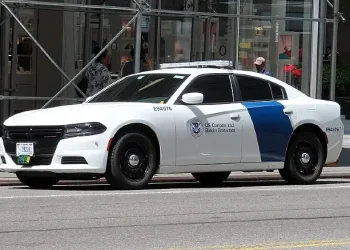Julio Cesar Chavez Jr., a renowned Mexican boxer and alleged Sinaloa Cartel affiliate, was detained by ICE in Studio City, California, on July 2, 2025.
He faces expedited removal due to an active arrest warrant in Mexico for organized crime and weapons trafficking.
This action underscores the U.S.’s renewed commitment to strict immigration enforcement under President Trump.
Background of the Arrest
Julio Cesar Chavez Jr. was apprehended by Immigration and Customs Enforcement (ICE) agents in Studio City, California.
The arrest occurred on July 2, 2025, following an active arrest warrant issued in Mexico for his involvement in organized crime and trafficking firearms, ammunition, and explosives.
Chavez entered the United States legally on a B2 tourist visa in August 2023. However, his visa expired in February 2024.
Despite applying for Lawful Permanent Resident status through marriage to a U.S. citizen with cartel connections, his application was denied due to fraudulent statements.
Immigration Challenges
- Chavez’s visa expired in February 2024; he remained illegally afterward.
- An attempt to gain permanent residency through marriage failed due to fraud.
- The Biden administration did not prioritize his removal despite public safety concerns.
- He reentered the U.S. at San Ysidro port of entry on January 4, 2025.
Criminal History and Public Safety Concerns
Chavez has a criminal history within the United States that includes DUI charges and illegal possession of assault weapons.
His alleged ties to the Sinaloa Cartel further exacerbate concerns about public safety given the cartel’s designation as a Foreign Terrorist Organization under President Trump’s administration.
Tackling Organized Crime
- The Sinaloa Cartel is implicated in violent crimes affecting U.S. citizens.
- The cartel plays a significant role in fentanyl trafficking across borders.
- This arrest signals a tougher stance against organized crime affiliates within the U.S.
- The case highlights ongoing debates over immigration enforcement priorities.
Diplomatic Relations with Mexico
The extradition or removal of individuals wanted for serious crimes could enhance cooperation between the United States and Mexico regarding law enforcement efforts and border security measures.
Such actions may strengthen diplomatic ties while addressing mutual concerns over organized crime activities that transcend national borders.
Additional Reading
A Final Reflection
The detention of Julio Cesar Chavez Jr., linked to the notorious Sinaloa Cartel, marks a pivotal moment in U.S.-Mexico relations concerning organized crime control.
As both nations navigate these complex issues together, this case may set precedents for future collaborations aimed at enhancing security measures across shared borders while addressing transnational criminal activities effectively.
Sources: Department of Homeland Security, KFoxTV, and TMZS.
Prepared by Ivan Alexander Golden, Founder of THX News™, an independent news organization delivering timely insights from global official sources. Combines AI-analyzed research with human-edited accuracy and context.








